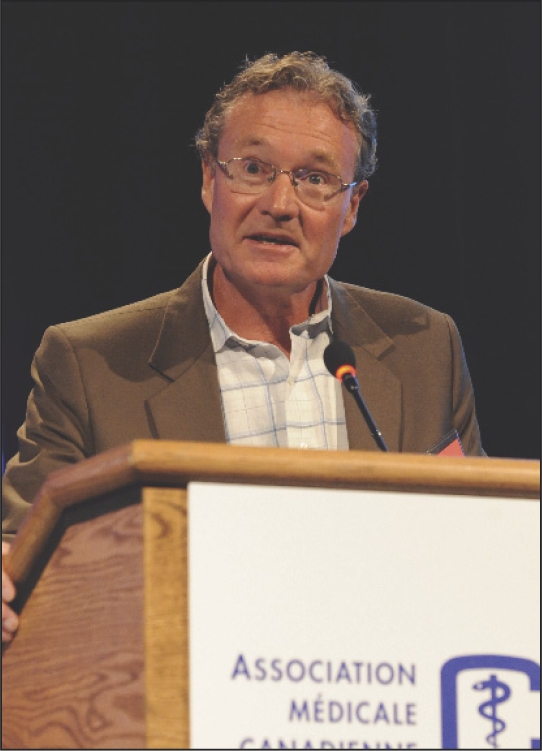The irony was almost palpable. On the same day that Canada’s doctors launched themselves on a trajectory that some believe is motivated by self-interest and may lead to two-tier medicine, delegates to the 142nd annual meeting in Saskatoon, Saskatchewan, officially elected as their 2010/2011 president a man who has long been an advocate for the rights of disadvantaged people.
Yet Canadian Medical Association (CMA) President-elect Dr. Jeff Turnbull, who’ll assume the reins in August 2010, appears to genuinely believe that being a voice for health care transformation and a voice for health care equity are not irreconcilable ambitions.
The specialist in internal medicine will be expected to actively and aggressively implement and promote the “transformation” agenda, a plan to introduce more market-driven forces in the Canadian health care system.
No problem, the chief of staff of the Ottawa Hospital says. “I believe in a new way of doing business. I believe in the transformation agenda.”
As the medical director for the Inner City Health Project for the homeless in Ottawa, Ontario, Turnbull is a renowned advocate for causes that many of his medical colleagues would cast as being of a markedly left-wing nature. Measures that Turnbull has introduced at Inner City include a palliative hospice and a program that provides a safe haven for street alcoholics and an hourly shot of booze (CMAJ 2001;165[7]:937).
“In the context of making changes [as CMA president], yes, I would like to have a specific interest in disadvantaged populations. They strike me as a group of people who are in desperate need of change in the way we deliver care,” Turnbull says.
Making an imprimatur as a president who will both shepherd implementation of the transformation agenda and advance the rights of the underprivileged to good health care is entirely feasible, he says. It’s an “opportunity to affect change and bring that to the context of disadvantaged populations, whether they be the elderly or the disabled or rural or Aboriginal or homeless. If I could bring better attention to the way we deliver services to those people, then I would be a very happy person.”
It should be possible to reconcile what appear to be two competing agendas because patient-centred care is the primary principle that underpins transformation, Turnbull says.
Although many of the initiative’s components are now vague, consensus is possible, even on controversial issues such as activity-based funding of hospitals, he adds. “The concepts are at 35 000 feet now. The challenge is going to be moving from 35 000 to 10 000 feet because … each one of those themes, when you drill down to specifics, it’s going to be controversial.” But accommodation can be reached if the focus is kept squarely on patient care, Turnbull says. “Some people will get pretty passionate about it. But, at the end of the day, if it’s the best for patients, physicians will do the right thing.”
The principles that underpin the transformation agenda, Turnbull adds, “are the vehicles through which you can affect meaningful changes to health services delivery, in my case, for vulnerable populations, but also for you, for me, for somebody in Regina. They’ll get the benefit of it too.”
Some might call that exceptionally ambitious, but it’s difficult to argue that it’s impossible for someone who has as many accomplishments listed on his resumé as he has animals — four horses, 12 to 14 cows, 42 lambs, about 100 meat chickens, 40 laying hens and a sheepdog named Chloe — on his 440-acre farm north of Ottawa.
Turnbull was named to the Order of Canada in 2007 and is the former chief and chairman of the Department of Medicine at the University of Ottawa, as well as the past president of the College of Physicians and Surgeons of Ontario. Turnbull has also been involved in international medical and educational projects, including helping develop a small rural hospital in Bangladesh, a nursing school in Kenya and a plan coordinating health care services in four regions of Nigeria. He’s about to coordinate a similar plan for the government of Angola.
Ottawa internal medicine specialist Dr. Jeff Turnbull will become CMA president in August 2010.
Mucking out the stalls, collecting eggs and baling hay on the farm is “100% therapy,” Turnbull says. “It isn’t making me money, that’s for sure.”
“It consumes a lot of my time and a lot of my passion. I love the farm. It’s just a great escape. You know, you drive out of Ottawa towards the Gatineau and you just feel all of the pressure leaving.” Turnbull is also an opera buff, cross-country skier and father of four adult children: Mike, Pete, Rebecca and Sarah.
Turnbull quickly demonstrates a rapier-like intellect that grasps the implications of inquiries, as well as the political savvy to dodge traps that might generate media controversy. Yet he does it with a charm that is both civil and remarkably unassuming.
“I am,” he says, “a very, very boring person. I don’t golf.”



